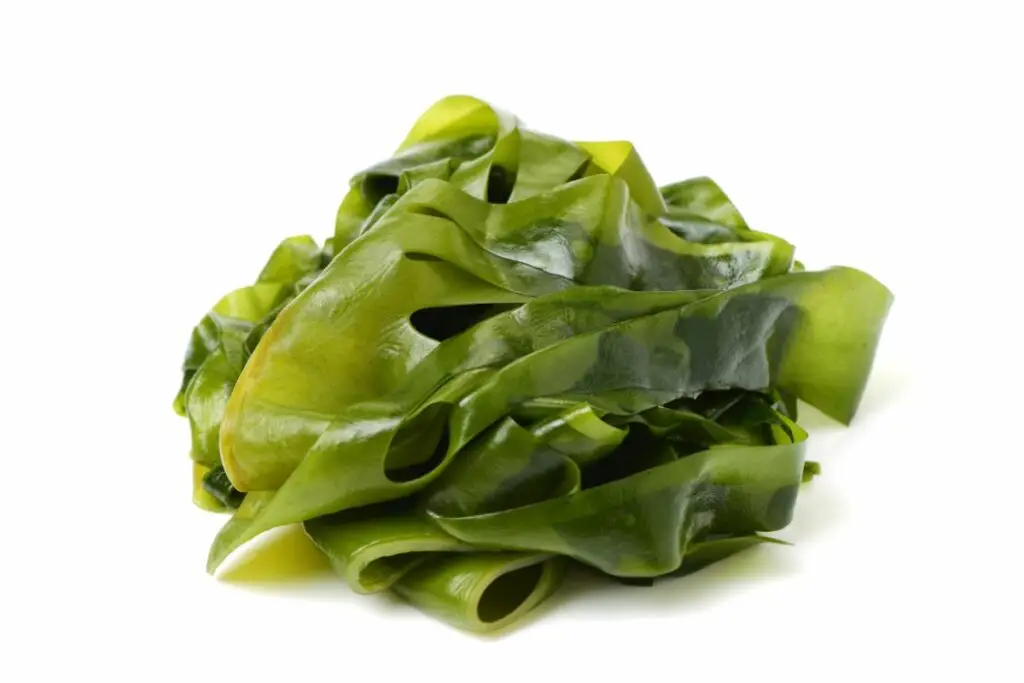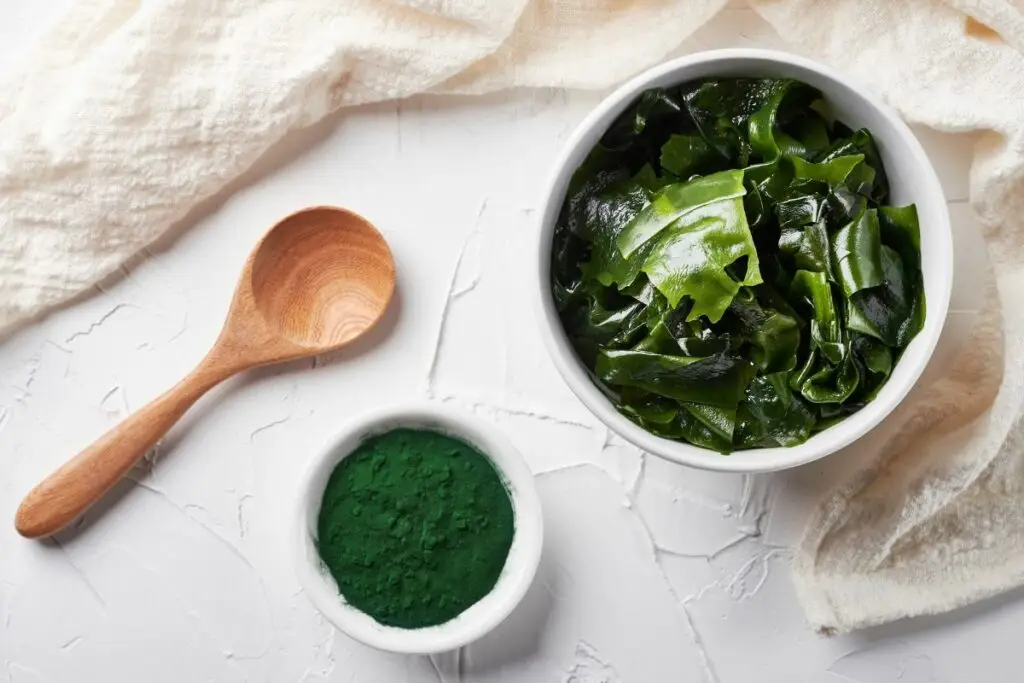
Kelp, a type of large brown seaweed, has quickly become known as a superfood in modern cooking. Its nutrient-rich profile offers a wide range of health benefits that make it a valuable addition to any diet.
Seaweed has become increasingly popular not only for its health benefits, but also for its potential to contribute to sustainable food production. Its cultivation requires minimal resources compared to land-based crops and can even improve ocean health by absorbing excess nutrients from seawater.
This versatile ingredient is now used in various dishes around the world, including salads, soups, snacks, and powders. Its rising popularity highlights the connection between nutrition and sustainability, positioning kelp as a superfood with widespread advantages.
What is Kelp?
Kelp is a type of large brown seaweed that thrives in shallow ocean waters, forming dense underwater forests known as kelp forests. These marine ecosystems play a critical role in supporting biodiversity, providing habitat and food for various marine species.
Different Types of Kelp
Different types of kelp offer unique characteristics:
- Sugar Kelp (Saccharina latissima): Recognizable by its sweet taste, this type of kelp has long, flat blades and is often used in culinary applications.
- Gracilaria Seaweed (Gracilaria spp.): Known for its reddish hue and delicate texture, Gracilaria is frequently harvested for agar production, a gelatinous substance used in food and microbiology.
The Importance of Kelp
Kelp’s significance extends beyond its nutritional benefits; it acts as a natural carbon sink, absorbing carbon dioxide from the atmosphere and helping to mitigate climate change. With its diverse forms and ecological importance, kelp represents a vital component of marine life and human nutrition.
Why is Kelp Considered a Superfood?
Kelp is often referred to as a superfood due to its impressive nutritional profile. Here’s why it’s considered so beneficial:
Nutritional Powerhouse
Kelp is packed with essential nutrients that our bodies need to function optimally:
- Amino Acids: Kelp contains all nine essential amino acids, which are crucial for protein synthesis and overall bodily functions.
- Minerals: It is rich in minerals such as calcium, iron, and magnesium. These minerals play vital roles in bone health, oxygen transport, and muscle function.
- Vitamins: Kelp provides a significant amount of vitamins C and D. Vitamin C is known for its immune-boosting properties, while vitamin D supports bone health and calcium absorption.
Iodine Content
One of the standout features of kelp is its high iodine content. Iodine is essential for proper thyroid function, which regulates metabolism and energy levels.
Low-Calorie, Low-Fat Food Source
Kelp is also a low-calorie and low-fat food source, making it an excellent addition to various diets. It supplies the necessary nutrients while not exactly adding excessive calories.
Potential Risks
While kelp offers numerous health benefits, it’s important to be aware of potential risks:
- Iodine Overconsumption: Excessive intake of iodine can lead to thyroid dysfunction. It’s advisable to consume kelp in moderation.
- Heavy Metals: Some seaweeds may contain heavy metals like arsenic or lead due to environmental contamination. Opting for certified organic sources can mitigate this risk.
Incorporating kelp into your diet can provide an array of health benefits, while being mindful of its consumption levels ensures you reap these benefits safely.

Scientific Studies Highlighting the Benefits of the Superfood
Anti-Inflammatory Properties and Chronic Disease Risk
Research indicates that kelp possesses significant anti-inflammatory properties. A study published found that compounds in kelp, such as fucoidans, can reduce inflammation in the body, potentially lowering the risk of chronic diseases like arthritis and cardiovascular conditions. These findings suggest that incorporating kelp into your diet may contribute to overall health and well-being.
Alginate Fiber and Weight Management
Kelp is rich in alginate fiber, a type of dietary fiber known for its unique properties. According to another study, alginate can enhance satiety by slowing down digestion, which may aid in weight management. This makes kelp an excellent addition to diets aimed at achieving or maintaining a healthy weight.
Blood Sugar Control with Vanadium
Another notable compound found in kelp is vanadium. Research published has linked vanadium to improved blood sugar control 3. While more studies are necessary to fully understand this relationship, preliminary results are promising for individuals managing diabetes or pre-diabetic conditions.
These studies underscore kelp’s potential as a superfood with wide-ranging health advantages. As research continues, we may uncover even more reasons to incorporate this marine vegetable into our daily meals.
Ways to Incorporate Kelp into Your Diet
Kelp’s inclusion in modern cuisine is versatile and exciting, making it a valuable addition to various dishes.
Culinary Applications of Kelp
Kelp can be enjoyed in multiple forms:
- Noodles: Use kelp noodles as a low-calorie alternative to traditional pasta.
- Snacks: Dried kelp chips offer a crunchy, nutrient-dense snack.
- Powders: Kelp powder can be added to smoothies, soups, and sauces for an extra nutrient boost.
Healthy Seaweed Recipe
Keto Kelp Noodle Stir-Fry Recipe
Ingredients:
- 1 pack of kelp noodles
- 1 tbsp coconut oil
- 2 cloves garlic (minced)
- 1 bell pepper (sliced)
- 100g chicken breast (sliced thin)
- 2 tbsp soy sauce
- 1 tsp sesame oil
- Salt and pepper to taste
Instructions:
- Properly rinse out the kelp noodles in cold running water till clean and then put it aside.
- Pour some coconut oil into a pan, then heat it on the fire.
- Sauté garlic until fragrant, then add chicken breast slices.
- Add bell pepper slices and continue to stir-fry until vegetables are tender.
- Mix in the kelp noodles, soy sauce, sesame oil, salt, and pepper.
- Cook for another 3-5 minutes, ensuring all ingredients are well combined.
Integrating kelp into your diet can enhance both flavor and nutritional value, making it an excellent choice for health-conscious individuals. You can also increase your kelp intake by buying healthy protein shakes and smoothies from Shakeup Superfoods that are chock-full of this superfood and more.
Conclusion
Kelp offers a wide range of health benefits, making it a valuable addition to any diet. This nutrient-dense seaweed is not only rich in essential vitamins and minerals but also supports thyroid function due to its high iodine content. Its anti-inflammatory properties, potential role in reducing chronic disease risk, and ability to aid in weight management through alginate fiber make kelp a standout superfood.

